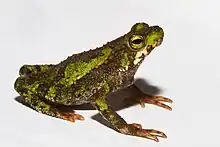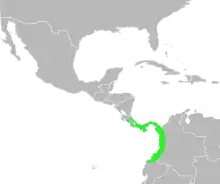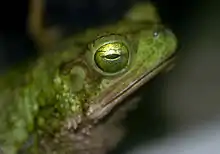Incilius coniferus
The evergreen toad (Incilius coniferus)[3] is a species of toad in the family Bufonidae.
| Evergreen toad | |
|---|---|
 | |
| Scientific classification | |
| Domain: | Eukaryota |
| Kingdom: | Animalia |
| Phylum: | Chordata |
| Class: | Amphibia |
| Order: | Anura |
| Family: | Bufonidae |
| Genus: | Incilius |
| Species: | I. coniferus |
| Binomial name | |
| Incilius coniferus (Cope, 1862) | |
 | |
| Incilius coniferus range map. The range is displayed in green. | |
| Synonyms | |
| |
Conservation status
It is potentially threatened by habitat loss, but is still categorized as a least-concern species by the International Union for Conservation of Nature. A species cannot be assigned to the least-concern category unless it has had its population status evaluated.
Description

The evergreen toad (also known as the "green climbing toad"[4]) can be colored with browns, greens, and even yellows. These colors on its back and other areas of the body are arranged in a camouflage pattern that can be unique between each member of the species. Its eyes are green with vertically slit pupils.
Adult males of the species can measure approximately 53–72 mm and adult females 76–94 mm. Females and males in adulthood or easy to tell apart due to males usually having just abit brighter coloring. However, when they haven't metamorphosed yet, males and females are practically indistinguishable as all the tadpoles look identical.
Distribution and habitat
It is found in Colombia, Costa Rica, Ecuador, Nicaragua, and Panama.
The toad is commonly found in lowland wet and moist forest zones, and is less frequently found in per-mountain wet forest and lower mountain wet forest zones. Its natural habitats are subtropical or tropical moist lowland forests, rivers, freshwater marshes, rural gardens, urban areas, and heavily degraded former forest. The Pacific Equatorial Forest is also this green toad's home.
Altitude
It is present up to 1,550 m (5,090 ft) above sea level.[5]
References
- IUCN SSC Amphibian Specialist Group (2020). "Incilius coniferus". IUCN Red List of Threatened Species. 2020: e.T54614A54341464. doi:10.2305/IUCN.UK.2020-2.RLTS.T54614A54341464.en. Retrieved 15 November 2021.
- Frost, D., et al. (2006). The amphibian tree of life. Bulletin of the American Museum of Natural History 297 364.
- Incilius coniferus, ASW5
- "Incilius coniferus". Encyclopedia of Life. EOL.org. Retrieved 17 December 2016.
- Savage, J. M. (2002). The Amphibians and Reptiles of Costa Rica. University of Chicago Press, Chicago and London.
